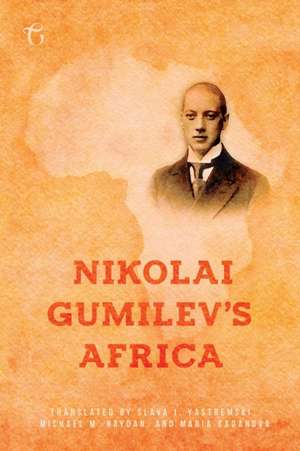Nikolai Gumilev's Africa
Autor Nikolai Gumileven Limba Engleză Paperback – 15 aug 2018
| Toate formatele și edițiile | Preț | Express |
|---|---|---|
| Paperback (1) | 148.50 lei 43-57 zile | |
| GLAGOSLAV PUBLICATIONS B.V. – 15 aug 2018 | 148.50 lei 43-57 zile | |
| Hardback (1) | 200.36 lei 22-36 zile | |
| GLAGOSLAV PUBLICATIONS B.V. – oct 2018 | 200.36 lei 22-36 zile |
Preț: 148.50 lei
Nou
Puncte Express: 223
Preț estimativ în valută:
28.41€ • 29.75$ • 23.51£
28.41€ • 29.75$ • 23.51£
Carte tipărită la comandă
Livrare economică 07-21 aprilie
Preluare comenzi: 021 569.72.76
Specificații
ISBN-13: 9781911414636
ISBN-10: 1911414631
Pagini: 234
Dimensiuni: 152 x 229 x 13 mm
Greutate: 0.35 kg
Editura: GLAGOSLAV PUBLICATIONS B.V.
ISBN-10: 1911414631
Pagini: 234
Dimensiuni: 152 x 229 x 13 mm
Greutate: 0.35 kg
Editura: GLAGOSLAV PUBLICATIONS B.V.
Notă biografică
Western readers perhaps know Nikolai Gumilev primarily as the husband of the great Russian poet Anna Akhmatova. In his time Gumilev was one of the most important figures in the culture of the Silver Age in Russia, even before his marriage to Akhmatova (who incidentally was not yet an established poet when they married). He was the founder of Russian literary Acmeism, which focused on "beautiful clarity" (the poet Mikhail Kuzmin's term) and simplicity of expression instead of the profoundly complex nature of the word in Russian Symbolism. Gumilev's poetry is characterized by vivid imagery, bright colors, and exotic locales that entered his poems from numerous travels to France, Italy, England, and, to what became most important to him, Africa. The poet rightly called the source of his creativity the Muse of Distant Travels. Gumilev's was executed in August 1921 on charges that he participated in a counterrevolutionary conspiracy. Those charges recently were proven to have been completely fabricated by the Soviet secret police. He was the first major artistic figure to fall victim to the Soviet regime, and his name, especially in immigrant circles, became a symbol of resistance to Soviet totalitarianism.
